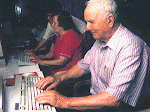Hayward, CA - Chiropractic researchers have published a groundbreaking study that supports the use of chiropractic manipulation in the management of death.
 |
| A chiropractor, shown here using a former patient to demonstrate the Inverted Yo-Yo Ma maneuver to a current patient |
"Death has always been something that the chiropractic community has meant to get around to," Jill Alcabaz DC, head of the Department of Subluxation Justification at Life Chiropractic College West, explained. "This new study is a good first step, and should encourage chiropractors to begin offering their services as a management option when a patient presents to their clinics already dead, or dies during care. Maybe for like 50 bucks? Does that sound reasonable?”
Since first appearing in the 15th century, the concept of death has largely been ignored by conventional medical doctors despite numerous advances in the management of things like appendicitis and broken bones. It’s hard to even get some doctors, like Well Baby Nursery attending Mort Fishman MD, to even discuss it. “Death? No, that’s not something I worry about. Wait, who are you?”
Ignoring something doesn’t make it go away, however, and death remains one of the more prominent challenges faced by healthcare providers. Some experts in chiropractic, like palliative care chiropractor Frank Grimes, have been working to integrate the treatment of spinal subluxations into end of life care for decades. "Chiropractic is an advanced approach to healing that definitely wasn't just made up by one guy a hundred years ago. I’m not at all surprised by the study findings. It's nice having some solid research to support what I already knew in my heart was science."
The study, published today in Online Publishing Module #18,712 - Chiropractic for the Recently Deceased, compared usual care plus chiropractic to usual care alone in the management of a patient diagnosed with acute death. The study authors found a statistically and emotionally significant difference, and they were all really pleased with themselves. Alcabaz, who was involved with the recruitment and analysis phases of the study, is calling for additional and more definitive research. "As robust as this result was, more research will be needed to convince the skeptics, who are already pointing out trivial issues, like how we didn’t rule out sleep.”

No comments:
Post a Comment